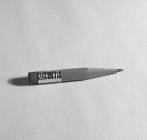I remember being happy, once, for about half an hour. I am ten or eleven, and I am at school on a warm and still summer’s day. I have just finished lunch, and because it is warm and dry and there is no real prospect of anyone getting all muddy, they have let us come onto the playing field. Right at the back is a little strip of woodland, all that remains of what must have been in ancient times a real wood that extended northwards, right down into the valley and up the other side. But now, all that remains of this ancient wood is a little strip of trees and scrub running along the back of the field, hardly thirty feet deep. Under these trees I lie, propped up on my elbow so that I can read a book that I am resting on the dry pine needles next to me. I have with me one of my favourite books – and I have it still, The Pictorial Encyclopædia[1] – that my uncle gave to me four or five years earlier – not on my birthday, or at Christmas, not wrapped up or officially presented. Sitting in the passenger seat of my father’s Ford Anglia, my uncle one day turned around to address me in the back, and said that here was a book he had found that he thought I might find interesting.
So for half an hour, I lay in the cool shade of the woodland trees, hidden from view, completely detached from the sweltering world beyond, feeling more safe than I usually did, engrossed as I turned the pages of this wonderful, wonderful book, completely absorbed in the pictures, enchanted by the human skeleton, by the insides of a locomotive, by the complex rigging of a sailing vessel, by the plumage of tropical birds. Here is a drawing of nine different types of roof, from the simple ‘flat’ to the much more complicated ‘hammer beam’ and ‘double hammer beam’, and opposite is a drawing showing different types of arches and vaults. Here is a page that crudely outlines the history of agriculture. Oh, how interesting the world is! It may well have been this very book, those few years before, when I was first given it, that first got me addicted to interesting things. And my addiction has grown. It is perhaps the only thing of comparable size that I can put in the scales on the side opposite my despair. However low my despair may have laid me, it has never, yet, vanquished my finding interesting things interesting. In interesting things, I did sometimes come across the merest glimmer of enthusiasm, until some frustration intervened and demolished my fragile mood. And now, in these hateful times, it is the evil of neoliberalism that makes the reawakening of my unstable enthusiasm utterly impossible. I have no right to be enthusiastic about interesting things whilst the vulnerable and downtrodden, here and right around the world, are being abused by a rich elite that abuses its power to bleed everyone else dry. I cannot be the enemy of that power if I am distracted by enthusiasm for anything other than the destruction of that power.
[1] There is no date, but it must have been published earlier than 1952, for that is the year my grandfather enters in his inscription, declaring the book a gift to my uncle (when he was a teenager). The book’s editors and contributors have crammed an astonishing breadth of knowledge into its 230 pages, and include articles on human anatomy, the steam locomotive, mathematics, astronomy, the natural world, the ancient world, tanning and papermaking, pottery and printing, architecture and musical instruments, housebuilding and shipbuilding, the history of science and the story of global exploration. That I can ever answer questions in quizzes must in large part be down to this very book. It is rather like a self-contained, mini-Internet for the pre-electronic age.


